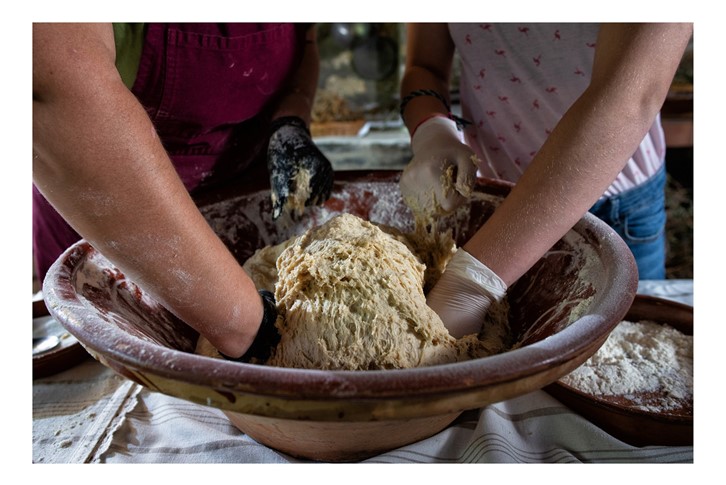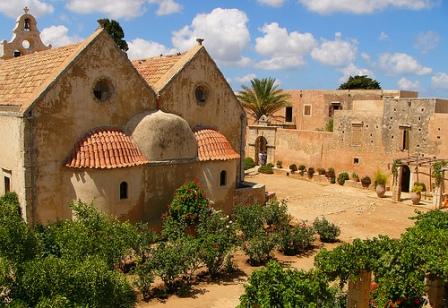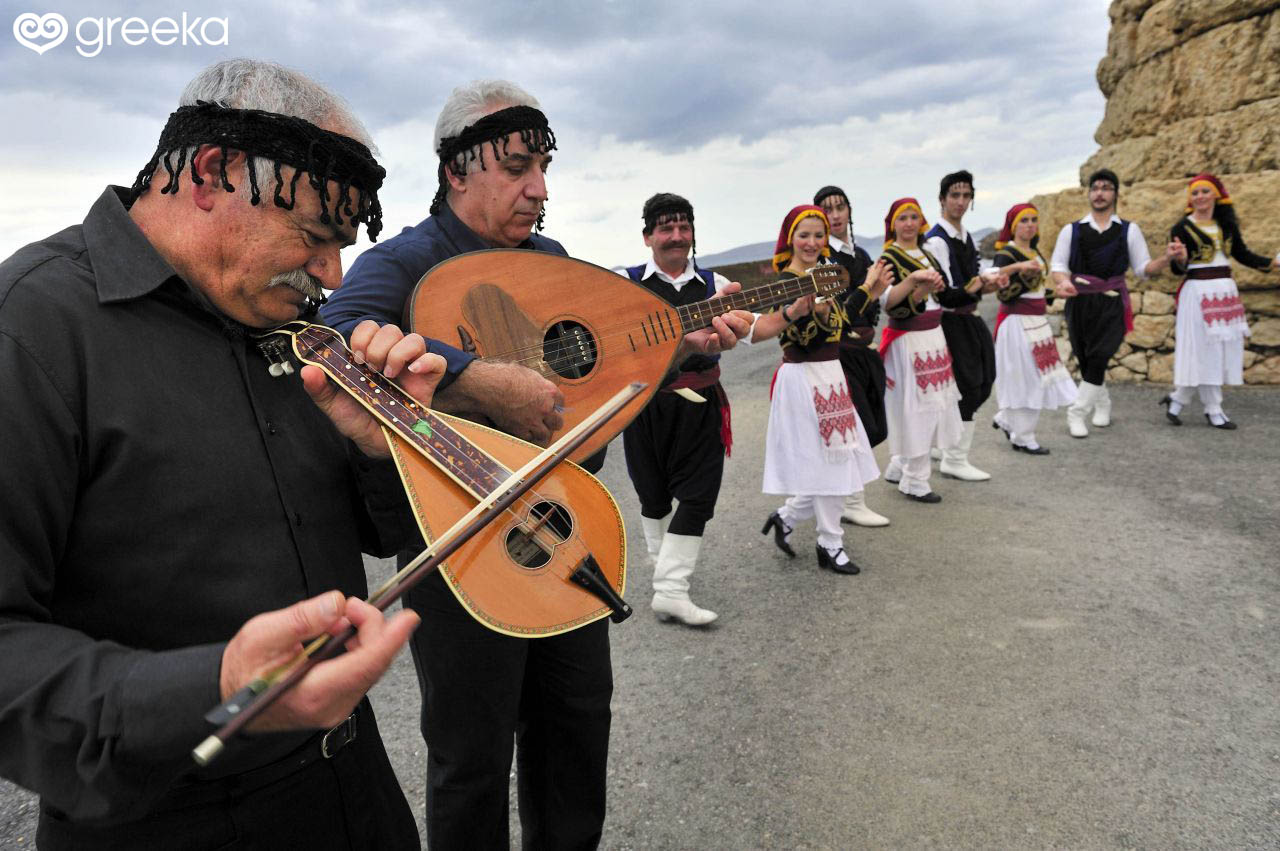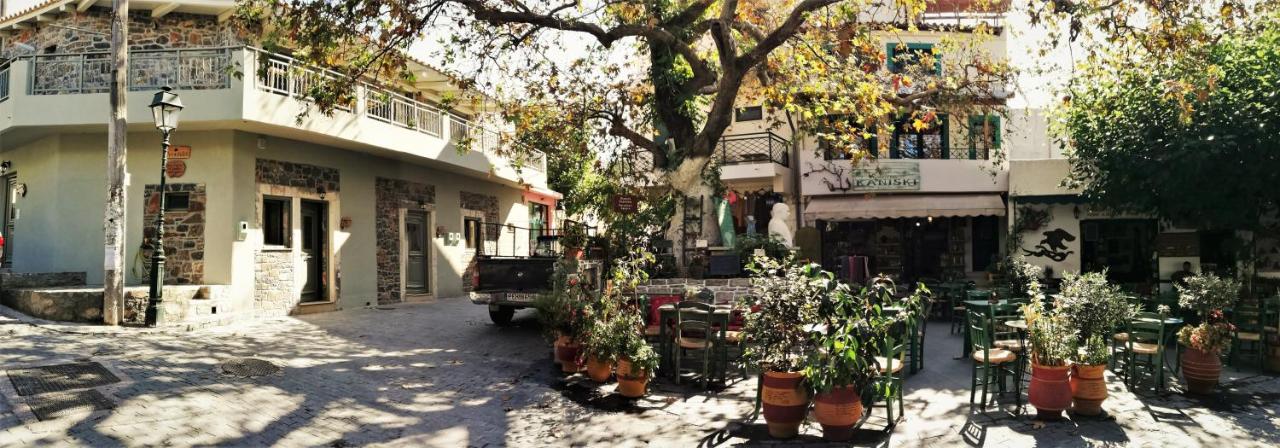Exploring Agritourism in Crete: Unveiling the Bounty of Greece’s Largest Island

Nestled in the heart of the Aegean Sea, Crete beckons travelers with its rich history, stunning landscapes, and vibrant culture.
While famous for its ancient ruins and sun-kissed beaches, Crete also offers a lesser-known yet equally captivating attraction: agritourism.
With its fertile soil, diverse terrain, and centuries-old agricultural traditions, Crete is a prime destination for those seeking to immerse themselves
in rural life, savor local flavors, and experience sustainable travel.
Agricultural Heritage of Crete:Crete boasts a long and storied agricultural heritage, dating back to ancient times.
The island's mild climate and fertile soil have nurtured a wide array of crops, including olives, grapes, citrus fruits, and herbs.
Traditional farming methods, such as terraced vineyards and stone-built olive presses, still dot the landscape, serving as a testament
to Crete's agricultural legacy.
Agritourism Experiences:
Visitors to Crete have a plethora of agritourism options to choose from,
each offering a unique glimpse into the island's rural life and culinary traditions. One popular activity is olive oil tasting tours,
where travelers can visit local olive groves, learn about the olive oil production process, and sample award-winning olive oils
paired with traditional Cretan cuisine. For those interested in viticulture, wine tasting tours provide an opportunity
to explore Crete's burgeoning wine scene. From the sun-drenched vineyards of the Heraklion region to the rugged slopes
of the White Mountains, visitors can savor the flavors of indigenous grape varieties like Vidiano, Vilana,
and Kotsifali while soaking in breathtaking views of the countryside.
Farm Stays and Agro-Resorts:

For a truly immersive experience, many farms and rural estates in Crete offer accommodations ranging from cozy guesthouses
to luxurious agro-resorts. Guests can wake up to the sounds of roosters crowing, participate in farm activities such as grape
harvesting or cheese making, and indulge in farm-to-table meals prepared with fresh, local ingredients.
Culinary Workshops and Cooking Classes:
Cretan cuisine is renowned for its simplicity, freshness, and emphasis on seasonal ingredients. Cooking enthusiasts can partake in hand
s-on culinary workshops and cooking classes led by local chefs, where they'll learn to prepare traditional dishes like dakos
(rusk salad), ntakos (barley rusk with tomatoes and feta), and moussaka using locally sourced produce and herbs.
Hiking and Nature Tours:
Beyond its agricultural bounty, Crete is also blessed with breathtaking natural beauty, including rugged gorges, pristine beaches,
and snow-capped mountains. Agritourism operators offer guided hiking and nature tours that take visitors off the beaten path to explore
hidden gems like the Samaria Gorge, the Lassithi Plateau, and the palm forest of Vai, while learning about the island's flora,
fauna, and environmental conservation efforts.
Sustainable Practices: Crete's agritourism industry is committed to promoting sustainability and responsible tourism practices.
Many farms and eco-lodges employ organic farming methods, utilize renewable energy sources, and implement waste reduction initiatives
to minimize their environmental footprint. Additionally, community-based tourism initiatives empower local farmers and artisans,
preserving traditional livelihoods and cultural heritage for future generations.
Challenges and Opportunities
 :
:
While agritourism holds great promise for Crete's rural communities, it also faces challenges such as seasonal fluctuations in tourist
demand, infrastructure limitations, and competition from larger hospitality chains. However, with strategic planning, investment in
infrastructure, and collaboration between stakeholders, agritourism has the potential to drive economic development, preserve cultural
identity, and protect the island's natural resources.
In conclusion, agritourism offers a window into the soul of Crete, allowing travelers to connect with the land, its people,
and its traditions in meaningful ways. Whether sipping olive oil under the Mediterranean sun or hiking through ancient olive groves,
agritourism in Crete promises an unforgettable journey of discovery, authenticity, and sustainability.
With its diverse array of experiences and commitment to responsible tourism,
Crete stands as a shining example of agritourism done right, showcasing the best of Greece's largest island to the world.
Exploring Agritourism in Heraklion:
Agritourism in Heraklion invites travelers to immerse themselves in the island's rural life, traditions, and flavors. From olive oil tastings at family-owned groves to hands-on cheese-making workshops in mountain villages, agritourism experiences showcase the diverse bounty of Crete's land and the warmth of its people. With the convenience of car rentals, travelers can easily access remote farms, eco-lodges, and agritourism establishments nestled amidst the olive groves and vineyards of the Heraklion countryside.

Wine Tasting Tours in Heraklion:* Heraklion's wine country beckons wine enthusiasts with its scenic vineyards, ancient wine presses, and award-winning wineries. Wine tasting tours offer a journey through the island's viticultural heritage, from the sun-drenched slopes of Archanes to the rugged hillsides of Peza. With a rented car at their disposal, travelers can explore the region's wine routes, attend grape harvest festivals, and indulge in cellar tastings, all while enjoying the freedom and flexibility to discover hidden gems off the beaten path.
Cultural and Culinary Experiences in Heraklion:
Heraklion's rich history and culinary traditions come to life through a variety of cultural experiences and gastronomic delights. Travelers can visit archaeological sites like Knossos, the ancient capital of Minoan Crete, to learn about the island's vinicultural heritage depicted in frescoes and artifacts. Cooking classes and culinary workshops offer opportunities to pair Cretan wines with traditional dishes, while farm-to-table dining experiences showcase the freshest ingredients sourced directly from local farms and producers.
Car Rentals in Heraklion:
Car rentals in Heraklion provide travelers with the freedom and flexibility to explore the region at their own pace. With a wide selection of vehicles available, from compact cars to SUVs, travelers can easily navigate the island's scenic roads and rugged terrain. Whether embarking on a day trip to the mountain villages of Psiloritis or venturing along the coastal routes of Agia Pelagia, car rentals offer convenience and accessibility for agritourism and wine tasting adventures in Heraklion.
Sustainability and Responsible Travel in Heraklion:
As travelers engage in agritourism, wine tasting, and car rentals in Heraklion, it's important to prioritize sustainability and responsible travel practices. By supporting local farmers, winemakers, and eco-friendly accommodation providers, travelers contribute to the preservation of Crete's natural and cultural heritage. Additionally, opting for fuel-efficient vehicles and minimizing carbon emissions help mitigate the environmental impact of travel, ensuring that future generations can continue to enjoy the beauty and bounty of Heraklion, Crete.
Farm-to-Table Dining Experiences:

Crete's agritourism scene extends to its dining options, with many restaurants and tavernas embracing the farm-to-table concept. Travelers can dine at establishments that source ingredients directly from local farmers and producers, ensuring the freshest and most authentic culinary experience. From rustic tavernas serving traditional Cretan dishes to upscale eateries highlighting innovative farm-fresh cuisine, there's something to satisfy every palate.
Traditional Crafts and Workshops:

In addition to agricultural pursuits, agritourism in Crete encompasses traditional crafts and artisanal workshops. Travelers can visit pottery studios to witness skilled artisans shaping clay into beautiful ceramics using techniques passed down through generations. Similarly, weaving workshops offer insight into the intricate art of loom weaving, where visitors can try their hand at creating textiles using locally sourced fibers.
Cultural Festivals and Events:
Throughout the year, Crete hosts a variety of cultural festivals and events that celebrate the island's agricultural heritage. From olive harvest festivals in the fall to grape stomping celebrations during the wine harvest season, these events provide an opportunity for visitors to immerse themselves in local traditions, music, and dance. Additionally, agricultural fairs and markets showcase the bounty of Crete's land, featuring fresh produce, artisanal products, and traditional crafts.
Educational Farm Visits:

Agritourism in Crete also includes educational farm visits tailored to families and school groups. These interactive experiences allow children and adults alike to learn about sustainable farming practices, animal husbandry, and the importance of biodiversity conservation. Farms often offer guided tours, hands-on activities, and nature walks designed to foster a deeper understanding and appreciation of the natural world.
Community-Based Tourism Initiatives:

Crete's agritourism sector is closely tied to community-based tourism initiatives that empower local residents and foster sustainable development. Cooperative networks of farmers, artisans, and hospitality providers work together to offer authentic and responsible tourism experiences that benefit both visitors and host communities. By supporting these initiatives, travelers can contribute to the preservation of Crete's rural heritage and the well-being of its inhabitants.
Ecotourism in Crete: Embracing Nature, Culture, and Sustainability


Crete, the largest island in Greece, is renowned for its pristine beaches, rugged landscapes, and rich cultural heritage. In recent years, the island has emerged as a leading destination for ecotourism, offering travelers the opportunity to explore its diverse ecosystems, support local communities, and promote environmental conservation. From protected natural areas to traditional villages and sustainable initiatives, Crete's ecotourism scene embodies a harmonious balance between tourism development and ecological preservation. *Natural Wonders of Crete:* Crete's natural beauty is unparalleled, encompassing a range of ecosystems from mountainous terrain to coastal wetlands. The island is home to several protected areas, including the Samaria Gorge National Park, Europe's longest gorge, and the White Mountains Biosphere Reserve, a UNESCO-designated site renowned for its biodiversity. Travelers can hike through ancient forests, kayak along crystal-clear rivers, and observe rare wildlife species in their natural habitats, all while experiencing the awe-inspiring beauty of Crete's landscapes.
Cultural Heritage and Traditional Villages:
*
1 Archanes

Explore this traditional Cretan village known for its vineyards, olive groves, and well-preserved architecture. Rent a car to visit nearby archaeological sites like Knossos and Phaistos.
2. Anogeia
: Immerse yourself in the rich cultural heritage of this mountain village, renowned for its traditional music and crafts. Renting a car allows you to explore nearby natural attractions like the Ideon Cave and Nida Plateau.
3. *Margarites


: Discover the centuries-old tradition of pottery-making in Margarites, where local artisans continue to craft ceramics using traditional techniques. A rental car provides the flexibility to explore nearby villages and scenic routes through the countryside.
4. *Zaros

: Experience the tranquility of Zaros, nestled at the foothills of Mount Psiloritis and surrounded by lush vegetation and freshwater springs. With a car rental, you can explore the nearby Rouvas Gorge and hike along its scenic trails.
5. Agia Galini:
Enjoy the laid-back atmosphere of this coastal village, known for its sandy beaches, traditional tavernas, and stunning views of the Libyan Sea. Renting a car allows you to explore nearby beaches, such as Agios Pavlos, and ancient sites like Phaistos.
6. Paleochora:
Relax on the sandy beaches of Paleochora, a coastal village surrounded by rugged cliffs and crystal-clear waters. With a rental car, you can explore the picturesque villages of the southwestern coast, including Sougia and Loutro. 7. Sougia:
Experience the unspoiled beauty of Sougia, a small seaside village nestled between the mountains and the Libyan Sea. Rent a car to explore the scenic surroundings, hike the Agia Irini Gorge, or visit the ancient site of Lissos.
8. Kritsa:
Step back in time in the traditional village of Kritsa, known for its narrow streets, Byzantine churches, and panoramic views of the surrounding mountains and valleys. With a car rental, you can visit nearby attractions like the Katharo Plateau and the Dikteon Cave.
9. *Vamos*
Discover the charm of Vamos, a traditional mountain village with well-preserved Venetian architecture, cobblestone streets, and a vibrant local culture. Renting a car allows you to explore the nearby Apokoronas region, with its olive groves, vineyards, and hidden beaches.
10. *Spili*:
Explore the picturesque village of Spili, famous for its Venetian fountain adorned with lion heads and its traditional architecture. With a rental car, you can visit nearby attractions such as the Kourtaliotiko Gorge and the Preveli Monastery.
11. *Kato Zakros*:
Experience the tranquility of Kato Zakros, a coastal village located on the eastern edge of Crete. Known for its Minoan archaeological site and pristine beaches, Kato Zakros offers visitors a glimpse into ancient history and natural beauty. With a car rental, you can explore nearby attractions such as the Zakros Gorge and the charming villages of eastern Crete.
12. *Plaka (Apokoronas)*:
Nestled in the lush greenery of the Apokoronas region, Plaka is a traditional village with stunning views of the Aegean Sea and the White Mountains. Visitors can wander through the village's narrow alleys, visit local tavernas and cafes, and explore nearby attractions such as the Almyrida Beach and the historic city of Chania.
13. *Agios Ioannis (Lassithi)*:
Located in the heart of the Lassithi Plateau, Agios Ioannis is a picturesque village surrounded by fertile farmland and rolling hills. Visitors can explore the village's traditional architecture, visit local churches and monasteries, and enjoy outdoor activities such as hiking and birdwatching. With a car rental, you can explore the scenic landscapes of the Lassithi Plateau and visit attractions such as the Dikteon Cave and the Psychro Cave.
14. *Kato Pano Elounda*:
Situated near the popular tourist destination of Elounda, Kato Pano Elounda is a charming village with traditional stone houses and stunning views of the Mirabello Bay. Visitors can stroll along the village's narrow streets, visit local shops and cafes, and enjoy panoramic views of the surrounding coastline. With a car rental, you can explore nearby attractions such as the island of Spinalonga and the ancient city of Olous.
15. *Agia Pelagia*:
Located on the northern coast of Crete, Agia Pelagia is a vibrant seaside village known for its sandy beaches and crystal-clear waters. Visitors can relax on the beach, enjoy water sports such as snorkeling and scuba diving, and explore the village's shops, restaurants, and bars. With a car rental, you can explore nearby attractions such as the Minoan palace of Knossos, the archaeological site of Gortyna, and the picturesque village of Fodele.
16. Myrtos*:
Tucked away on the southern coast of Crete, Myrtos is a charming fishing village known for its relaxed atmosphere and scenic beauty. Visitors can wander along the waterfront promenade, sample fresh seafood at local tavernas, and soak up the sun on the village's sandy beach. With a car rental, you can explore nearby attractions such as the Myrtos Palm Beach and the Sarakina Gorge.
17. *Piskopiano*:
Perched on a hillside overlooking the coastal town of Hersonissos, Piskopiano is a traditional Cretan village with stunning views of the Aegean Sea. Visitors can wander through the village's narrow streets, admire the traditional architecture, and dine at local tavernas serving authentic Cretan cuisine. With a car rental, you can explore nearby attractions such as the archaeological site of Malia and the Lassithi Plateau.
18. *Mirthios*:
Located near the popular tourist destination of Plakias, Mirthios is a tranquil mountain village with panoramic views of the Libyan Sea and the surrounding countryside. Visitors can explore the village's charming alleyways, visit local shops and cafes, and enjoy traditional Cretan hospitality. With a car rental, you can explore nearby attractions such as the Preveli Monastery and the Amari Valley.
19. *Agios Georgios (Sfakia)*
Situated in the rugged landscape of the Sfakia region, Agios Georgios is a small village with a rich history and stunning natural beauty. Visitors can explore the village's Byzantine churches, visit local tavernas and cafes, and hike along scenic trails leading to nearby beaches and gorges. With a car rental, you can explore the remote and rugged terrain of the Sfakia region, including the famous Samaria Gorge and the Loutro coastal village.
20. *Kournas*:
Nestled at the foot of the White Mountains, Kournas is a picturesque village known for its freshwater lake, the only natural lake in Crete. Visitors can take a leisurely stroll around the lake, enjoy a boat ride on its tranquil waters, and dine at local tavernas offering traditional Cretan cuisine. With a car rental, you can explore nearby attractions such as the traditional village of Argyroupoli and the ancient city of Aptera.
21. *Ano Asites*:
Situated in the foothills of Mount Psiloritis, Ano Asites is a traditional Cretan village surrounded by olive groves and vineyards. Visitors can explore the village's narrow streets, visit local tavernas serving homemade Cretan dishes, and hike along scenic trails leading into the mountains. With a car rental, you can explore the nearby Nida Plateau, known for its stunning views and unique flora and fauna.
22. *Ano Viannos*:
Located in the southeastern part of Crete, Ano Viannos is a mountain village with a rich history and breathtaking scenery. Visitors can explore the village's traditional architecture, visit local churches and museums, and enjoy panoramic views of the surrounding mountains and valleys. With a car rental, you can explore nearby attractions such as the Richtis Gorge and the village of Kato Viannos.
23. *Omalos*:
Nestled in the heart of the White Mountains, Omalos is a small mountain village surrounded by rugged terrain and pristine wilderness. Visitors can explore the village's traditional stone houses, hike along scenic trails leading into the mountains, and visit nearby attractions such as the Samaria Gorge and the plateau of Askifou. With a car rental, you can explore the remote and rugged landscapes of the White Mountains, including the villages of Sfakia and Agia Roumeli.
24. *Asites*:
Located in the foothills of Mount Psiloritis, Asites is a traditional Cretan village known for its natural beauty and rich cultural heritage. Visitors can explore the village's charming streets, visit local tavernas and cafes, and hike along scenic trails leading into the mountains. With a car rental, you can explore nearby attractions such as the Ideon Cave, the birthplace of Zeus, and the ancient city of Gortyna.
25. *Zoniana*:
Perched on the slopes of Mount Psiloritis, Zoniana is a mountain village known for its traditional architecture, lush vegetation, and panoramic views of the surrounding countryside. Visitors can explore the village's narrow streets, visit local museums and churches, and hike along scenic trails leading into the mountains. With a car rental, you can explore nearby attractions such as the cave of Sfendoni and the village of Anogia, known for its traditional music and crafts.
In addition to its natural wonders, Crete boasts a rich cultural heritage that dates back thousands of years. Ecotourism in Crete offers travelers the opportunity to explore traditional villages, where time-honored customs and crafts are preserved. Visitors can participate in agricultural activities such as olive harvesting and grape stomping, learn about traditional architecture and local cuisine, and engage with artisans practicing age-old crafts like pottery and weaving. These authentic cultural experiences provide insights into the island's history and foster connections between travelers and local communities.
Sustainable Accommodation and Eco-Lodges:
Crete's ecotourism infrastructure includes a growing number of sustainable accommodations and eco-lodges that prioritize environmental responsibility and community engagement. From off-grid eco-villages nestled in the mountains to eco-friendly guesthouses overlooking the sea, travelers can choose from a variety of options that minimize their carbon footprint and support local economies. Many eco-lodges offer organic gardens, renewable energy sources, and educational programs on sustainability, providing guests with an immersive and eco-conscious travel experience.
*Adventure and Outdoor Activities:*
For adventure enthusiasts, Crete offers a wide range of outdoor activities that showcase the island's natural landscapes and cultural heritage. Travelers can embark on guided hiking and cycling tours through scenic trails, explore underwater caves and marine reserves while scuba diving or snorkeling, and embark on birdwatching expeditions to observe migratory species in their natural habitats. Adventure ecotourism experiences in Crete combine adrenaline-fueled activities with opportunities for environmental education and conservation awareness.
Community-Based Tourism Initiatives:*
Crete's ecotourism industry is characterized by community-based tourism initiatives that empower local residents and foster sustainable development. Cooperative networks of farmers, artisans, and hospitality providers work together to offer authentic and responsible tourism experiences that benefit both visitors and host communities. Through homestays, cultural exchanges, and participatory activities, travelers can support local livelihoods and contribute to the preservation of Crete's natural and cultural heritage.
*Challenges and Opportunities:*
Despite its many benefits, ecotourism in Crete faces challenges such as overdevelopment, habitat degradation, and climate change. As the industry continues to grow, it is essential to strike a balance between tourism development and environmental conservation, ensuring that fragile ecosystems and cultural traditions are safeguarded for future generations. Sustainable practices, community involvement, and responsible tourism management are crucial for realizing the full potential of ecotourism in Crete while preserving the island's natural and cultural treasures.
In conclusion, ecotourism in Crete offers travelers a unique opportunity to connect with nature, immerse themselves in local culture, and contribute to environmental conservation efforts. From exploring pristine landscapes to engaging with traditional communities and supporting sustainable initiatives, ecotourism allows visitors to experience the island's beauty and heritage in a responsible and meaningful way. By embracing ecotourism principles and practices, Crete is poised to become a model destination for sustainable tourism, demonstrating the transformative power of travel to create positive change for people and planet alike.






